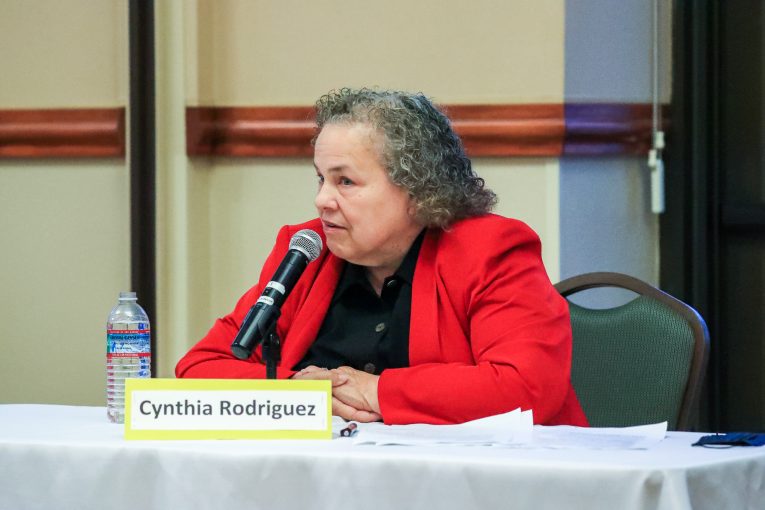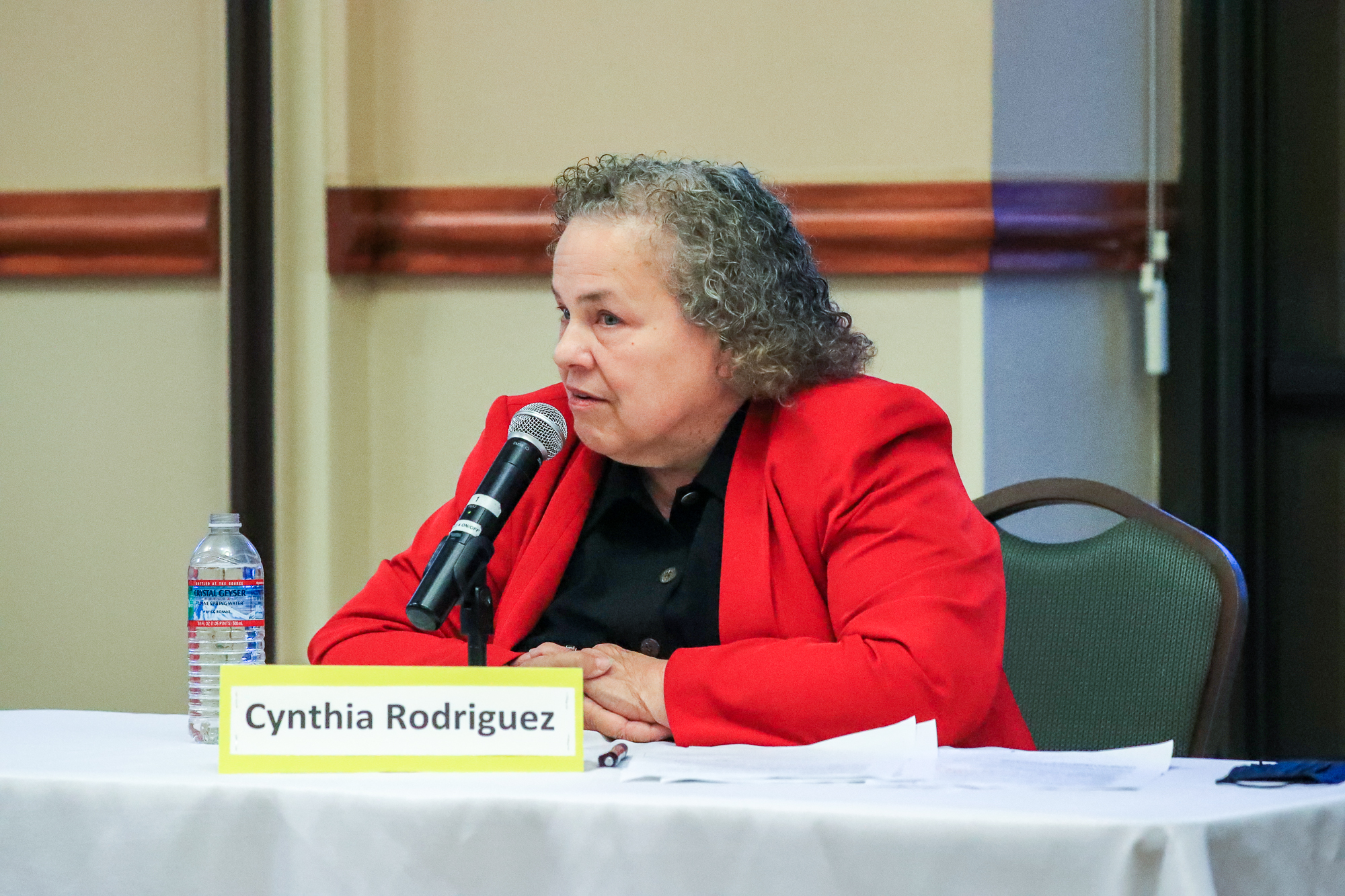
 RJI will soon publish RJI’s podcast with Cynthia Rodriguez, a candidate for Yolo County District Attorney in California. Because the election is next week, we are choosing to publish RJI’s Questionnaire to Candidates with Cynthia’s responses. When the podcast is up, we will share it. RJI was greatly encouraged by Ms. Rodriguez’s responses. RJI’s Global Advisory Council reviewed her questionnaire and voted to support her candidacy for Yolo County District Attorney. For the record, RJI reached out to the current Yolo County District Attorney regarding his re-election. He chose not to respond to RJI’s Questionnaire to Candidates.
RJI will soon publish RJI’s podcast with Cynthia Rodriguez, a candidate for Yolo County District Attorney in California. Because the election is next week, we are choosing to publish RJI’s Questionnaire to Candidates with Cynthia’s responses. When the podcast is up, we will share it. RJI was greatly encouraged by Ms. Rodriguez’s responses. RJI’s Global Advisory Council reviewed her questionnaire and voted to support her candidacy for Yolo County District Attorney. For the record, RJI reached out to the current Yolo County District Attorney regarding his re-election. He chose not to respond to RJI’s Questionnaire to Candidates.
Cynthia has 40 years of criminal legal experience—both prosecuting and defending cases—giving her an all-encompassing view of the strengths and weaknesses of the justice system.
At the Department of Corrections, Cynthia prosecuted misconduct in California prisons. She has served as a deputy public defender, standing up for the Constitutional rights of some of our most vulnerable community members and keeping innocent people free. Cynthia has also served as General Counsel and Deputy Director of Forensic Services at the California Department of Mental Health, where she managed an office of 200 employees with a multi-million-dollar budget.
Ms. Rodriguez responded to the RJI candidate questionnaire before the recording of RJI’s podcast with her. The following are her answers.
For more info go to RJI’s site.
————————————————————–
The following is RJI’s questionnaire for candidates seeking our endorsement. Thank you for responding to our questions. Please return the questionnaire to RJI.
NAME: Cynthia Rodriguez
Office you are seeking: Yolo County District Attorney
Experience: 40 years as an attorney, criminal defense attorney, prosecuted discipline matters on correctional officers and staff, private practice including pro bono work for disabled individuals including full hearings, CA Dept of Mental Health (later Dept of State Hospitals) Deputy Director and General Counsel, working with state prisons and federal courts, 11 years at CalPERS handling hundreds of millions of dollars in pension funding and worker issues, as well as all litigation, with a Board.
Contact information: Cynthia Rodriguez
- Do you support victims-driven restorative justice? Why? Yes, I do. This is the most effective and likely to succeed system of addressing criminal misconduct. A balance is restored as the victim can express their position and needs and obtain the acknowledgement of responsibility by the actor that they need to move forward. And the actor is most likely to understand their behavior, effects, and need for change, without the extreme shame which may limit their ability to make those changes which will make community safer.
- How have you supported restorative justice in the past? Or what is your experience with restorative justice? I have supported this by encouraging my clients who are defendants to work in this system and to move past their mistakes into a community supported position of forgiveness and participation in the social contract. I have studied this system and wholeheartedly support it to make real changes for persons who have made mistakes but are committed to success in the system.
- How will you apply restorative justice principles in your position if elected? I will enlarge the fledgling program in our county which serves far too few situations. It should include felonies and misdemeanors, and if a victim is willing to participate there should be no reason not to try this system. I will bring experts to make sure that as much as possible the charged parties maintain as good a record as possible to maximize their opportunities in life. I will create a follow up system to make sure that adjustments are available, as necessary.
- What will you do to respond to wrongful convictions? Do you believe exonerees are victims of the criminal justice system and deserve restitution? To respond to wrongful convictions, I will have a conviction integrity unit to review past convictions. Any sentence over 25 years and any case which is reported as problematic will be reviewed. I will have a fire wall so that members of that unit are not investigating cases which were originally conducted by attorneys with whom they work. I will also have an active Innocence team that will investigate cases in which there is a chance or evidence of innocence. It will be more than attorneys and investigators; it should have a panel of professionals from education and expert fields. Exonerees must be afforded restitution as they are clear victims of mistakes by the system in place.
- Do you support creating a prosecutorial conduct commission in your state? Yes, it is beyond time that we treat prosecutorial misconduct as the violation of law that it is and stop the total ignoring of lawbreakers in prosecution and often judicial appointments. Failure to acknowledge, publish and punish these violations of law creates an atmosphere of hypocrisy and disrespect for the law that often engenders further lawlessness. Lack of punishment and responsibility for lawbreaking also leads to a sense of entitlements which leads to a total failure to empathize or understand the parties whose lives they are judging. There must be review of prosecutorial behavior, and it will lead to consideration prior to appointment of prosecutors as judges.
- What do you think is the best way to end mass incarceration? We must enlarge diversion and other education programs, to create more opportunities to resolve charges without creating a criminal record. Successful diversion earlier in contacts with the criminal justice system will keep people out of the cycle of crime. We must stop prosecuting people with mental illness and instead treat mental illness as the medical issue that it is, with a strong program to have closely followed treatment and social services intervention. We must treat medical issues with medical intervention, and behavior which is caused by drug and alcohol use must be treated with treatment and monitoring. Juveniles should be treated outside of a court environment with intense programs to address their traumas and unaddressed needs. Intense attention should be applied to kids at a pivotal time to give them a sense of a successful future for themselves. And society should be told it cannot mail away its problem to a place behind prison walls, as they will return more alienated.
- Do you support in-custody restorative justice using crime victims (surrogates)? Do you support victim offender dialogue when victims and offenders choose to participate? Yes, to have successful reform we must work out the errors that were part of the problem to correct thought about how we got to where we are. All those programs should be mandatory for perpetrators, with surrogates for victims when needed.
- Do you support a victims’ right to restorative justice? What does that mean to you? Yes, a victim must have the right to fully understand and explain what all their losses come to and have perpetrators and those involved in the system as coordinators understand what they have experienced, the losses and suffering and the emotional and practical. To me the victim must have direct response from all involved, defendant, attorney, judge, and the advocates and other participants. Expressing and receiving support for their loss and need will make the difference in emotional well-being, future victimization, and trauma reduction. They must have an opportunity to have therapy, confrontation, and open expression of and acknowledgement of what (the perpetrator) did.
- Do you support diverting low-level offenders into community corrections where offenders are held accountable more directly? This is especially important. When restorative justice programming is used to encourage offenders to understand and address their victims or communities while living in a real community, they learn real life skills. I supervised a community corrections unit at the CA Dept of State Hospitals called Conrep, which provided training for Incompetent to Stand Trial defendants in the community instead of restraining them in jails for this training. This was highly effective, both with succeeding in restoring competency in a normal living situation and saving money. Community programming is the best programming.
- What other creative ways do you support the principles of restorative justice? It is being applied in law enforcement (i.e., restorative policing) and in environmental public policy (i.e., environmental restorative justice). Would you support these new applications of restorative justice? Yes, I would support these. There is no limit to the positive that can come with programing based on actual understanding and truth telling. Facing what has happened and learning to move on into the future with realistic understanding of what has happened and what must happen in the future is the most reasonable and effective way to limit criminal behavior and suffering in victims. We must embrace this system.
- How did you hear of RJI? I have read of it in articles about quality resolutions to criminal justice issues. This organization is mentioned often in circles of attorneys who are interested in reforming the criminal justice system.




